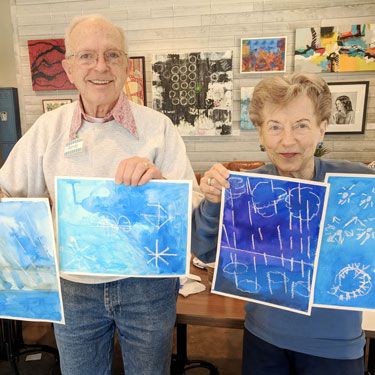
Memory Cafes are an opportunity to meet with others for support, companionship, and fun!
So, what exactly is a Memory Cafe?
Many people have been to a café, and most are relatively familiar with the term memory – but have you heard of a memory café? Far from a restaurant that makes you memorize a long list of menu items, memory cafés are primarily social gatherings where individuals with memory impairment and their caregivers can come together in a safe, supportive environment, share conversation over a cup of coffee, or participate in fun, simple activities with the group. It’s an opportunity to meet with others for support, companionship, and fun!
What is a Memory Café?
A memory café is a monthly gathering of individuals with memory loss along with their caregivers, or friends and family in a safe, supportive, and engaging environment. First and foremost, it is a social gathering - an opportunity to make new friends and interact without fear of embarrassment or being misunderstood. Many also find it an avenue for sharing concerns and providing support as well. Memory cafes share this as a similar mission, but many develop their own personality based on the interests of the current participants. Some are primarily social gatherings for conversation, some include structured activities such as arts, music, crafts or creative writing. Others may include an educational component; speakers are brought in to provide resources. Most meet once or twice a month for an hour or two to allow members to get to know one another and all share a positive experience.
Who should attend?
Anyone who is concerned about their memory is welcome to attend. Memory cafes can be great groups for those with Mild Cognitive Impairment or a diagnosis of dementia or memory impairment. Friends and family members of these individuals are encouraged to attend as well. The person with memory loss may attend individually if appropriate, but typically they are encouraged to attend with a caregiver, as the cafes are fun for everyone! No formal assessment or referral is needed.
When did Memory Cafés start?
Memory Cafes began emerging in Europe in the late 1990s. The concept originated in the Netherlands and spread to England in 2000, where the government provides funding. Many grassroots efforts have spread the concept, and the first Alzheimer’s café in the US started in Santa Fe in 2008. Because many groups take them on independently, it’s hard to know exactly how many there are in the US currently, but estimates suggest at least 100 to date. We have 7 Northern Virginia area memory cafes currently!
Where are there cafes?
Memory cafes are offered in a variety of settings and locations. Some operate in churches, others in local community centers, sometimes a museum or cultural center, and occasionally they even meet in an actual café! Again, each group is a little different, and the meeting location is typically a space large enough to be comfortable for all of the members of the group.
Why should I go?
For many, the diagnosis of dementia can be alienating. Families don’t know how to react, friends can pull away. It becomes harder to make those standing lunch dates as skills decline and doctor’s visits increase. Memory cafes provide an opportunity for normalcy. People can come together over a simple cup of coffee and enjoy each other’s company. They can have fun and laugh. Activities provide an outlet for couples to enjoy each other’s company and meet new friends in the process. Additional benefits come down the road as these new friends can be turned to for support and resources. Memory cafes allow people to remain socially engaged with others traveling the same journey.
Want to Come?
Check out our listing of local memory cafes to learn more about meetings in the Northern Virginia area. Insight's cafe is resuming in-person meetings this month - check us out!
Blog
"I like that IMCC focuses on dementia-related problems and provides a focal point for families to network and socially interact in coping with dementia. It provides a community that helps us in our struggle."







